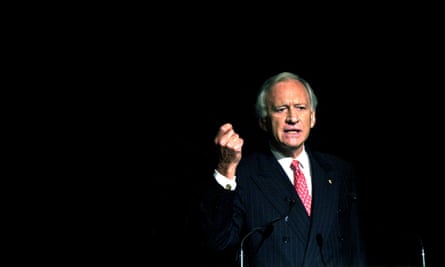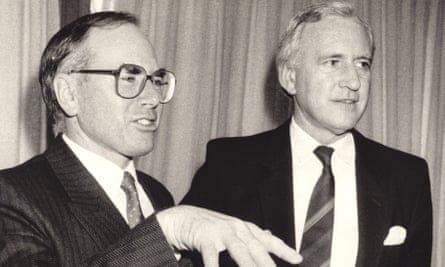The former federal Liberal party leader Andrew Peacock has died in the United States aged 82.
Peacock was the leader of the Liberal party for two stints in the 1980s and led the Australian conservatives to defeat at the 1984 and 1990 federal elections. He was the foreign affairs minister from 1975 to 1980 under Malcolm Fraser.
“To my beautiful loving most caring thoughtful generous and brilliant father, you will be so greatly missed, your guidance and deep love for us will live in my heart, we are absolutely devastated,” Ann Peacock wrote on social media on Friday night Australian time.
The Australian prime minister, Scott Morrison, said Peacock was “a great Australian and a treasure of the Liberal party”.
“He was one of our greatest Liberals who helped shape Australia and the Liberal party over three decades,” Morrison said in a statement on Friday night.

The treasurer, Josh Frydenberg, said Peacock “combined great elegance, style, and substance” and he was honoured to follow in Peacock’s footsteps as Kooyong MP.
“His passing will be mourned by those on both sides of the political aisle because he pursued his politics as he pursued life: with vigour, with dignity and with the utmost decency.”
Peacock entered parliament aged 27 following Robert Menzies as the member for Kooyong in Melbourne. “These were big shoes to fill, but he was not daunted and filled them in his own way,” Morrison said.
He spent 28 years in Canberra – initially dubbed the “colt from Kooyong” – and was a minister in the John Gorton, William McMahon and Fraser governments. After leaving parliament, he served as Australia’s ambassador to the United States.
Morrison said as the minister for external territories, Peacock built a close relationship with Michael Somare and was instrumental in gaining Australian acceptance for Papua New Guinea independence.
“His bonds with Papua New Guinea were such that he visited PNG over 50 times in his career,” the prime minister said. “In honour of this work, Papua New Guinea awarded Andrew Peacock the grand companion of the Order of Logohu making him an honorary chief.”
Despite losing two elections, Peacock “picked up seats against a popular prime minister” in both campaigns, Morrison said. “As Australia’s ambassador in Washington, he used his enormous personal skills to strengthen the close relationships with our most important strategic ally.”
Peacock, a moderate, had a longstanding rivalry with John Howard, who would go on to become Australia’s second-longest serving prime minister behind Menzies.
As leader in 1985, facing an uphill battle against the Labor prime minister, Bob Hawke, Peacock called a party meeting to try to remove Howard as deputy after having failed to receive an assurance his rival would not challenge for the top job.

When the party room re-elected Howard as deputy, snubbing Peacock, he resigned, clearing the way for Howard. But after Hawke won the 1987 election, Peacock was elected Howard’s deputy in a show of party unity.
Two years later a party-room coup toppled Howard and reinstalled Peacock but, after losing the 1990 election to Hawke, Peacock stepped down and John Hewson took over. Howard eventually became prime minister after winning the 1996 federal poll.
Howard said on Saturday that he had long ago “buried the hatchet” with Peacock, who he labelled a man of flair and distinction with a deep understanding of US politics.
“As is well known, Andrew and I had our differences but we well and truly buried the hatchet many years ago,” he said. “We were both very committed to the future of the Liberal party and, above all else, to our country.”
The former Victorian Liberal premier Jeff Kennett tweeted on Friday night that he and Peacock “shared a long friendship of political highs and lows”. “He was a very successful foreign minister,” Kennett said.
